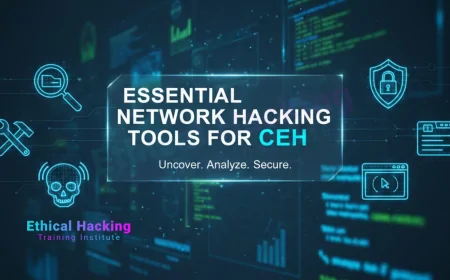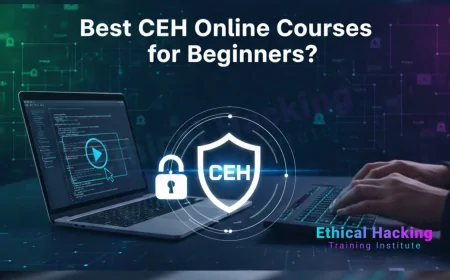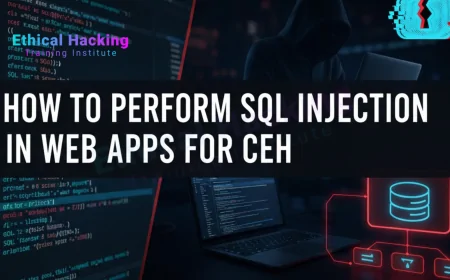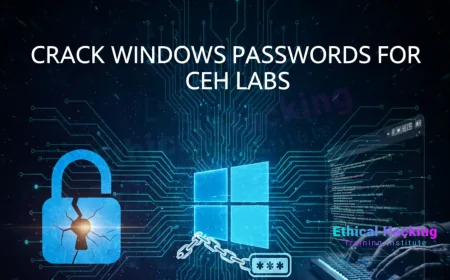Certified Hacker Certification: A Comprehensive Guide for Beginners | Beginner’s Guide to Certified Ethical Hacker (CEH) Certification
Beginner’s guide to certified hacker certifications. Learn top courses, career paths, tools, salaries, and how to start your ethical hacking journey.
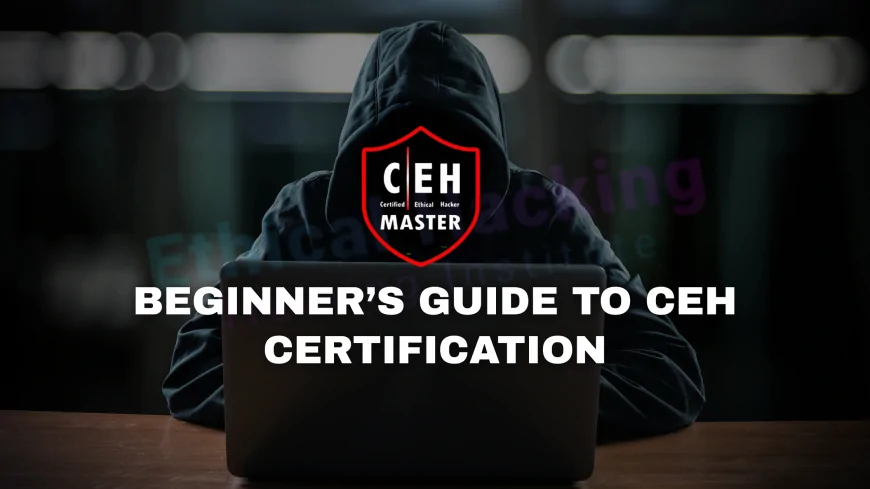
Table of Contents
- Introduction
- What is Certified Hacker Certification?
- Importance of Ethical Hacking
- Who Should Pursue This Certification?
- Popular Hacking Certifications for Beginners
- Skills Required to Become a Certified Hacker
- Step-by-Step Path to Becoming Certified
- Cost and Duration of Hacker Certifications
- Online vs Offline Ethical Hacking Training
- Tools You Learn During Certification
- Exam Pattern and Syllabus Overview
- Career Opportunities After Certification
- Top Institutes Offering Certified Hacker Programs
- Government Recognition and Compliance
- Industry Demand and Salary Outlook
- Continuing Education After Certification
- Freelancing and Bug Bounty Hunting
- Real-Life Success Stories
- Frequently Asked Questions (FAQs)
- Conclusion
Introduction
As the digital landscape expands, the need for skilled ethical hackers continues to rise. For beginners eager to break into the field of cybersecurity, earning a Certified Hacker Certification is a smart and future-proof career choice. This guide walks you through everything you need to know—from certification types to career opportunities, exam patterns, and tools you’ll use.
What is Certified Hacker Certification?
A Certified Hacker Certification validates an individual’s ability to legally and ethically test systems for vulnerabilities. It ensures that you have the knowledge and practical skills to perform penetration testing, vulnerability assessments, and security analysis. These certifications are often recognized globally and can be pursued by anyone interested in cybersecurity.
Importance of Ethical Hacking
Ethical hacking is the proactive defense mechanism that allows organizations to detect and fix vulnerabilities before malicious hackers exploit them. Certified ethical hackers play a critical role in safeguarding sensitive data and preventing cybercrimes, which cost global businesses billions of dollars each year.
Who Should Pursue This Certification?
- IT students and graduates
- Network administrators and system engineers
- Cybersecurity enthusiasts
- Software developers looking to upskill
- Aspiring professionals with enthusiasm for ethical hacking and digital security.
Popular Hacking Certifications for Beginners
- EC-Council Certified Ethical Hacker (CEH)
- CompTIA Security+ and PenTest+
- Certified Cybersecurity Entry-level Technician (CCET)
- Offensive Security OSCP (for advanced beginners)
- Google Cybersecurity Certificate (beginner-friendly)
Skills Required to Become a Certified Hacker
These skills aren't required, but having them can accelerate your understanding:
- Basic knowledge of networking (TCP/IP, protocols)
-
Understanding how Linux and Windows operating systems function
-
Understanding of programming (Python, Bash, or JavaScript)
- Problem-solving and analytical skills
Step-by-Step Path to Becoming Certified
- Start with a foundational course in networking or cybersecurity
- Choose an entry-level certification like CEH or Security+
- Enroll in a hands-on instructor-led course or take advantage of self-guided training options.
- Practice with tools like Nmap, Burp Suite, and Metasploit
- Take mock tests and complete lab exercises
- Schedule and pass your certification exam
Cost and Duration of Hacker Certifications
The cost varies depending on the certification. For instance:
- CEH: $1,000–$1,200 (exam + training)
- CompTIA Security+: ~$400
- OSCP: ~$1,500 (exam + lab access)
Duration: 2 to 6 months on average depending on the learning mode.
Online vs Offline Ethical Hacking Training
Online: Flexible, self-paced, access from anywhere. Platforms: TryHackMe, Coursera, Cybrary.
Offline: Hands-on labs, face-to-face mentoring, networking opportunities. Ideal for immersive learning.
Tools You Learn During Certification
- Nmap, Wireshark (for scanning and analysis)
- Metasploit (for exploitation)
- Burp Suite, OWASP ZAP (for web app testing)
- Aircrack-ng (for wireless testing)
- John the Ripper (for password cracking)
Exam Pattern and Syllabus Overview
Each certification has its own format. Example for CEH:
- Duration: 4 hours
- Format: Multiple-choice (125 questions)
- Passing score: 70%
- Topics: Reconnaissance, Scanning, Exploitation, Malware, Web Attacks, Cryptography
Career Opportunities After Certification
- Ethical Hacker
- Penetration Tester
- Security Analyst
- Vulnerability Assessor
- SOC Analyst
Top Institutes Offering Certified Hacker Programs
WebAsha Technologies is one of the leading cybersecurity training institutes in India, offering a wide range of certified ethical hacking and penetration testing courses for students, working professionals, and job seekers. Known for its hands-on labs, industry-aligned curriculum, and placement support, WebAsha is a top choice among beginners looking to start their hacking careers.
Key Certified Hacker Programs Offered by WebAsha:
- CEH (Certified Ethical Hacker) – EC-Council Authorized: Includes theoretical + practical modules with live labs and official exam prep.
- CompTIA Security+ and PenTest+ Training: Globally recognized certifications for foundational and intermediate-level ethical hacking.
- Web Application Hacking & Security: Learn OWASP Top 10, SQL Injection, XSS, CSRF, and advanced web exploits.
- Bug Bounty Hunting Program: Practice bug bounty skills on real platforms like HackerOne and Bugcrowd.
- Cyber Security Professional Diploma: A comprehensive training program that includes ethical hacking, network defense, and incident response.
Why Choose WebAsha for Hacker Certification?
- Authorized training partner for EC-Council and CompTIA
- Live labs, simulated attack scenarios, and red-team training
- Flexible batch timings (weekend, online, classroom)
- Affordable pricing and EMI options available
- Placement assistance and internship opportunities
Popular Locations: Pune, Mumbai, Delhi, Bangalore, and Online (Pan India)
Visit: https://www.webasha.com to explore their Certified Hacker Programs and enroll in a batch that suits your learning style and schedule.
Government Recognition and Compliance
Certifications like CEH are DoD 8570/8140 compliant and recognized by many government agencies worldwide. India’s NSDC and NASSCOM also support ethical hacking education under skill development missions.
Industry Demand and Salary Outlook
According to Cybersecurity Ventures, 3.5 million cybersecurity jobs remain unfilled globally. Entry-level certified ethical hackers can earn between ₹4–8 LPA in India and $70,000+ in the US.
Continuing Education After Certification
After earning your first certification, consider advancing to:
- OSCP – Offensive Security Certified Professional
- CompTIA CASP+ – Advanced Security Practitioner
- CISSP – Certified Information Systems Security Professional
Freelancing and Bug Bounty Hunting
Many certified ethical hackers work as freelancers, offering services on platforms like Upwork or Fiverr. Bug bounty programs on HackerOne or Bugcrowd pay hackers to find security flaws in real-world systems.
Real-Life Success Stories
Example: Megha Singh, a commerce graduate from Delhi, pursued CEH through an online course and now works as a SOC Analyst in a Fortune 500 company. Rohit Sharma, a mechanical engineer, transitioned into cybersecurity via PenTest+ and now works as a freelance penetration tester.
Frequently Asked Questions (FAQs)
1. What is a Certified Hacker Certification?
It’s a credential that validates your skills in ethical hacking, penetration testing, and cyber defense.
2. Which is the best ethical hacking certification for beginners?
The CEH by EC-Council is the most recognized certification for beginners.
3. Do I need a technical background to become a certified hacker?
No, but basic knowledge of networking and computers helps.
4. What tools are taught in hacker certifications?
Nmap, Burp Suite, Wireshark, Metasploit, and more.
5. Is CEH better than CompTIA Security+?
CEH focuses on ethical hacking; Security+ is more general. Your choice depends on your career goal.
6. How long does it take to become a certified ethical hacker?
It takes around 3 to 6 months of dedicated preparation.
7. What are the job roles after certification?
Ethical hacker, penetration tester, SOC analyst, security consultant.
8. What is the salary of a certified ethical hacker?
In India: ₹4–8 LPA; In the US: $70,000–$120,000 per year.
9. Are there free certified hacker courses?
Free courses are available but often lack certification. TryHackMe and Cybrary offer good beginner modules.
10. What is CEH Practical?
It’s a 6-hour hands-on lab exam to test real-world skills after CEH theory.
11. Is ethical hacking legal?
Yes, if done with permission and within legal boundaries.
12. Can I learn ethical hacking without coding?
Yes, but coding knowledge improves your capabilities significantly.
13. Which operating system is used in ethical hacking?
Kali Linux is the most widely used OS in ethical hacking training.
14. Can I get a job with just CEH?
Yes, CEH is often enough for entry-level cybersecurity roles.
15. Do I need to renew my hacker certification?
Yes. CEH is valid for 3 years and requires ECE credits for renewal.
16. Are these certifications globally accepted?
Yes, CEH and CompTIA certifications are accepted worldwide.
17. What are bug bounty programs?
They pay ethical hackers for finding vulnerabilities in live applications or websites.
18. Can I work as a freelancer after certification?
Yes, many ethical hackers work independently as consultants or freelancers.
19. Is CEH difficult to pass?
With the right preparation, CEH is achievable for most beginners.
20. Where can I take the CEH exam?
At authorized EC-Council test centers or online through remote proctoring.
Conclusion
Getting certified as an ethical hacker is one of the smartest career decisions for anyone interested in cybersecurity. With the right guidance, tools, and certifications, beginners can quickly transform into skilled professionals protecting digital infrastructures. The journey begins with a single course—take that first step today.
What's Your Reaction?
 Like
0
Like
0
 Dislike
0
Dislike
0
 Love
0
Love
0
 Funny
0
Funny
0
 Angry
0
Angry
0
 Sad
0
Sad
0
 Wow
0
Wow
0






